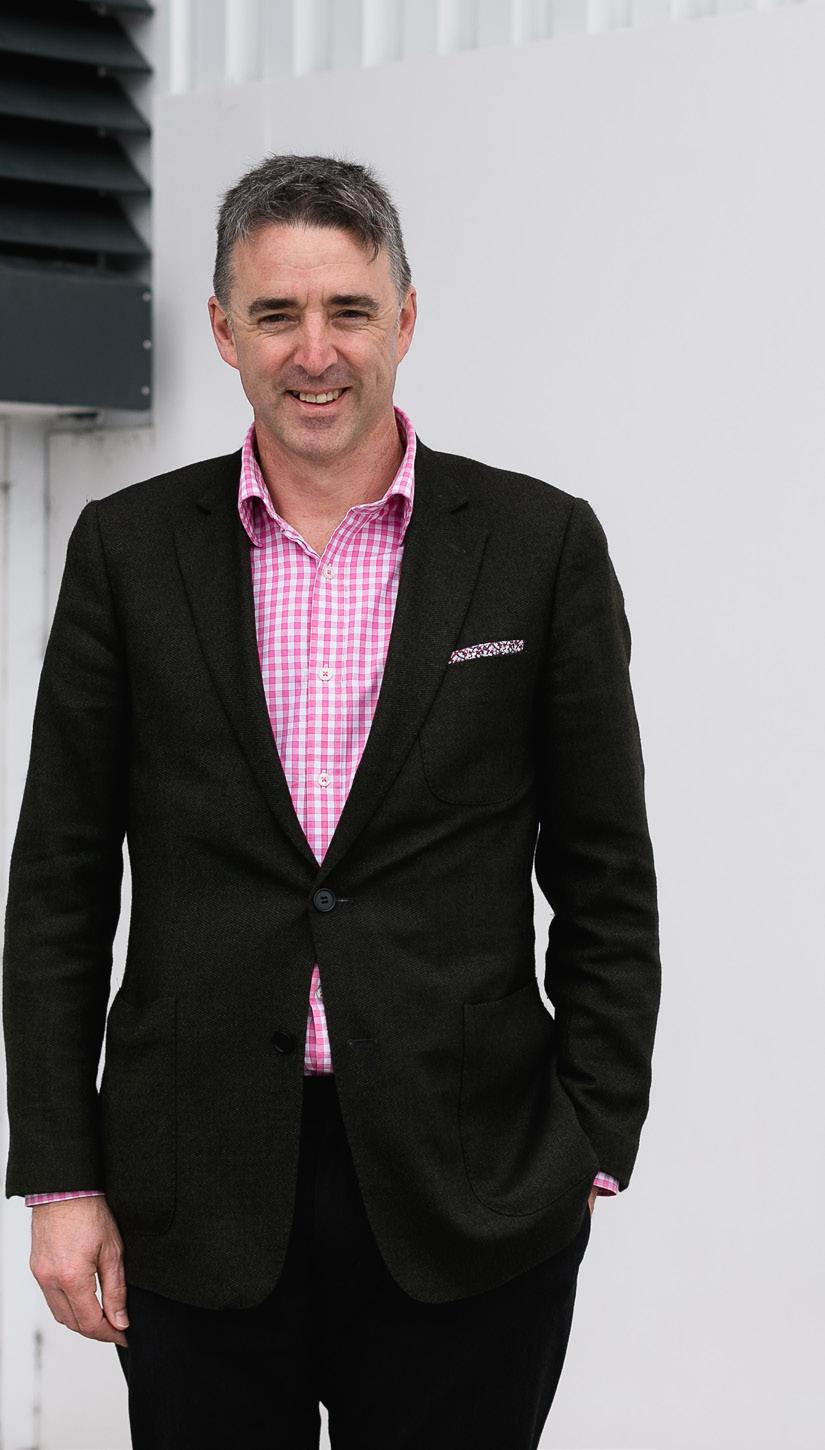
8 minute read
PROFILE
Taking up Law as a third career Peter McKenzie-Bridle, Good+Law, Wellington
Wellington based lawyer Peter McKenzie-Bridle has had an unusual route to the law. In fact, he’s had a pretty unique career path altogether. He started out as a social worker before moving into IT in the mid-nineties. Then in 2010 he decided to join the legal profession, completing his law degree at Victoria University of Wellington in 2013. Not one to stay still, Peter has also just started his sole-practice, Good+Law.
Advertisement
From social worker to IT whizz
“I originally decided to go into social work because I’ve always been concerned when people face hardship. I’ve a strong sense of empathy for others, particularly those who suffer the most in our society, so for me social work was all about helping individuals solve their problems.
It was a really challenging role. If I’m honest, I was a bit too much of a ‘heart on my sleeve’ social worker. I eventually began to bring some of my clients’ problems home with me which started to affect my mental well-being. It wasn’t a huge issue, but enough to make me question what I was doing.
When my wife, Kate, and I took our big OE in 1997, I intentionally looked for a non-social work job. Like many “amateur IT experts”, I had been playing around with computers at home and had a natural interest and inclination toward them. It was the time of the ‘Y2k bug’ and I found work quickly. There was heaps of IT work in London, even if you were unqualified and lacked experience.
IT is a really interesting sector which is always changing. It is incredibly collaborative and engaging and I was able to fill my boots doing varied and challenging work. Even though I am no longer working in the area, I still try to keep up with new developments.”
Why the change to law?
“Technology can devastate traditional business within a very short time – often within a matter of 2-3 years. One of the catalysts for changing to law was seeing how developments within IT decimated the careers people had built up around certain technologies. Once the technology changed, those skills quickly became redundant. I could see that potentially happening to me unless I kept pushing and developing myself.
Computers are interesting but nowhere near as interesting as people and I wanted to get back to working with people. I seriously considered heading back to social work but thought I’d just end up as a cynical old social worker!
My wife is a very good lawyer, and her side of the family is heavily populated with lawyers. Although I used to love rolling out the lawyer jokes, I realised that law provided a great opportunity to move into a career that allowed me to utilise the unique experiences I had picked up from my social work and IT backgrounds, and develop my skills and interests.
It was a privilege to be able to study for a few years. I was also the main caregiver for my three kids during that period which was time I really valued. And I met a bunch of great people at Law School, many of whom, like me, were taking on law as a second/third career and have made it work.
How do your backgrounds in IT and social services help you in your role as a lawyer?
“One common area between IT, social work and law is problem solving. Each profession involves solving complex problems, often with many moving parts. You need to be able to absorb a lot of information in a short period and make sense of it to give someone else an answer or response. It has only been since I entered legal practice that I’ve seen that link, and it’s been pleasing to see that my skills have been transferable this way.
However, problem solving in law is much more structured than IT or social work. When I went to law school, I discovered that my thinking had become a bit lazy – law challenges me to think about things more carefully, and it can be less forgiving when you overlook something that turns out to be important. My varied background gives me a different perspective on my clients’ problems and they seem to value my ability to un-muddle the problem.
Another link is communication. There is a surprising amount of
overlap in the communication and listening skills required to sell an IT solution to a large corporate, participate at a Family Group Conference, or explain my client’s concerns to a judge.
I have been able to utilise my IT skills to establish a paperless office that largely works as intended. My scanner works pretty hard, but I find most documents are exchanged electronically anyway and it’s easy to include them in my clients’ files. I also utilise full-text indexing on files so I can search for a phrase or word to locate a document I know is in one of my files.
My social work experience has kept me alert to increasing demands on our social services, and the pressure many people in our society face. Those demands continue to increase, the problems they are dealing with are more and more complex, and there is never enough time or resource.
Our courts are often left to deal with that fall-out. Social problems like inadequate access to mental health support, poor housing and addictions commonly show up in the criminal court and family courts. They can also be a key factor behind some of the disputes that arise in employment or in other relationships.
I have enjoyed learning how the legal system responds to these issues. I was a legal outsider when I worked in the social services, and there was always a mystique about court. I didn’t really get to grips with the process and left it to the lawyers, but it fascinated me.
Now that I work as a lawyer, my empathy for the lawyers working with these problems has increased. Complicated personal situations can really challenge our legal system. There are limits to what our courts can do, but sometimes the system can respond ingenuously, such as the creative use of bail and sentencing in the special circumstances court here in Wellington.
Moving into sole practice
with some really good practitioners since finishing my degree – Dan Vincent at Thomas Dewar and Andy Bell at Bell and Co. They have helped me to become a better lawyer than I otherwise would have been.
Lockdown disrupted some of my plans but also gave me time to think about how I wanted to practise. I am fortunate that I have recently been able to set up practice within a sort of nursery environment – an established set of offices with other sole-practice lawyers. Andy and Charles McGuinness have also supported me with referrals which I have really appreciated.
I saw setting up my own practice as an adventure and had to give it a go. It’s early days and hard to know if or how well I will succeed, but I don’t regret meeting the challenge.

Encouraging others to consider extending the scope of practice
“I remain involved in a number of community organisations, including the Mothers Project, which is part of the charitable trust founded by Stacey Shortall who is a partner at MinterEllisonRuddWatts. The project connects lawyers with women in prison, supporting them to maintain or repair relationships with their children.
I got involved in Mothers Project through my wife, Kate, who was doing a family law education session for volunteers. I did the Oranga Tamariki segment and became interested in the project from there.
I have since helped develop some online resources (with huge help from Antonia Leggat and Maddy Pears – a couple of Minters lawyers) and take referrals from the prison social workers for mothers who have Family Court matters and no representation. A few mothers have looked at me sideways when I’ve told them I used to work for Oranga Tamariki, but they eventually soften up and start to trust me.
I have also joined the New Zealand Law Society’s mentoring programme as a mentor. The programme is a great way to connect with lawyers who are walking a road I have only recently been on. I wasn’t sure what to expect but I’ve found that mentees really value just having someone to bounce things off – whether it is job hunting, developing their career, moving into private practice or just chewing the fat.
I regularly volunteer at the Wellington Community Law Centre in the employment session, and also take on some legal aid cases in employment, family and ACC.
Perhaps it is because of my background in social work, but I have been surprised at how few lawyers do legal aid work or volunteer at Community Law Centres. I don’t want to guilt anyone, but I believe that as lawyers we hold a lot of influence over who gets to access our legal system. Paraphrasing Spiderman: With great influence comes great responsibility. Because we have that influence, I think we owe it to society to make justice accessible to all.
A recent LawTalk article identified only 462 civil legal aid providers, with only 35 of them doing five or more cases a year. That work covers everything from employment to debt recovery to contract disputes. I realise that legal aid rates are very low which often discourages many lawyers from taking legal aid cases. However, if all lawyers took on only a few cases then together that would make on enormous impact on reducing some of the legal access barriers.
Currently though, too few of us are providing services to those that can’t pay market rates. This leads to some problems going unaddressed because getting a lawyer is simply unaffordable. Taking on some legal aid funded clients or volunteering at Community Law sessions really helps to reduce some of the barriers.
The profession could also respond in different ways to that challenge. For example, the profession could own the challenge by introducing something like the 10 hours CPD but requiring each lawyer to demonstrate 10 hours each year they have given back to the community. That may be through education, volunteering at Community Law Centres, doing pro bono work, taking on legal aid cases, assisting Mothers Project and the like.
Many lawyers already do that, but more of us could. It needn’t be a chore, and instead it could be something the profession is really proud of; something that demonstrates our positive contribution in society.” ▪
Peter McKenzie-Bridle can be contacted at peter@good-law.co

